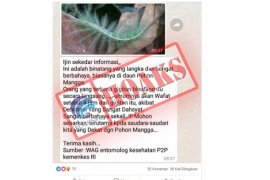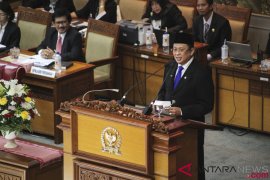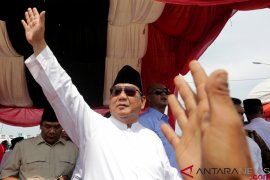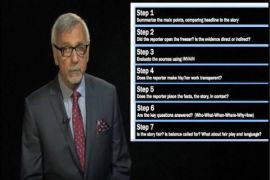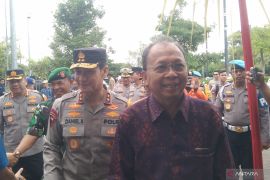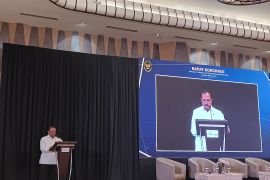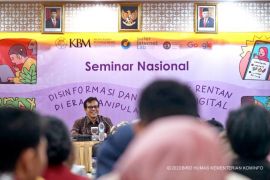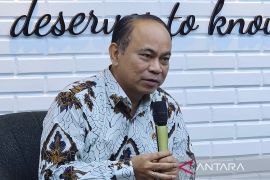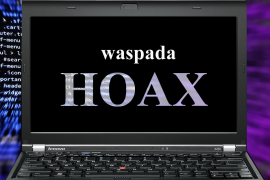In the era of social media like today, fake news and hoaxes have become a serious challenge and demanded public awareness and carefulness as they circulate everywhere.
If people are not careful and selective about what they consume and read, then fake news and hoaxes will become the truth.
According to Merriam-Webster Dictionary, fake news is, simply, news (material reported in a newspaper or news periodical on a newscast) that is fake (false, counterfeit) while a hoax is something accepted or established by fraud or fabrication.
Furthermore, according to Cambridge Dictionary, fake news is false stories that appear to be news, spread on the internet or using other media, usually created to influence political views or as a joke.
A hoax is a plan to deceive a large group of people or a trick, according to the Cambridge Dictionary.
In conclusion, fake news is false information already reported in the media and hoax is false information prepared to deceive several people, which could become the source for creating fake news.
Fighting hoax and fake news
Head of the Radar, Viral, and JACX Unit of ANTARA News Agency M. Arief Iskandar stated that the way to fight fake news and hoaxes is to verify the information on hand.
JACX stands for “Jaringan ANTARA Cegah Hoax” (ANTARA Network to Prevent Hoax).
He stated that the easiest way to check whether information is true or not is by doing a search on the internet search engine Google.
“Just scroll on Google and look for news from mass media that has been recognized (accredited mass media),” Iskandar remarked.
That approach has been proven earlier when information was circulated that former prime minister of Malaysia, Mahathir Mohamad, passed away.
The information had spread around chat groups and on social media, yet no mass media or news agency had written the news after conducting some searches on Google.
The information was then finally debunked when Mahathir Mohamad uploaded his picture from his official account on social media and attended an inauguration ceremony on the same day when the false information spread.
Iskandar also noted that news requires fact-checking and source verification.
“Media has its responsibilities and its code of ethics to ensure that the information disseminated is true,” he remarked.
In ANTARA, about 400-450 pieces of information were proven by the JACX Unit as hoaxes per year, Iskandar remarked.
However, they are being selective regarding the issue or information to prove whether it is a hoax.
“(We pick) various issues, especially related to matters that are important to the public,” he remarked.
Mainstream media are facing more challenges in this digital era since false information is not only in the form of text but also photos or videos, also known as deepfakes.
According to Merriam-Webster Dictionary, a deepfake is an image or recording that has been convincingly altered and manipulated to misrepresent someone as doing or saying something that was not actually done or said.
Iskandar stated that some applications can help prove whether an image or video is a deepfake.
"There is also an application that can detect videos and sounds that are made by AI (Artificial Intelligence),” he added.
Again, since it is not easy for people to use applications to prove whether an image or video is a deepfake, they can search the image or video related to it on accredited mass media.
Digital literacy and awareness
Digital literacy is an individual’s ability to find, evaluate, and communicate information through typing or digital media platforms.
Having digital literacy and awareness is of utmost importance in fighting fake news and hoaxes in this digital era.
Iskandar said that the media is responsible for ensuring that the information it has disseminated is correct or ensuring the information in society is correct.
However, he said, people cannot rely on media alone to fight fake news and hoaxes.
It is also important for people to be critical of information they consume and read, especially on social media.
“Not all information on social media is true. People need to start thinking 'Maybe this is not true,'” he remarked.
Through such awareness, people can start searching for more information to confirm whether the information they have on hand is false.
“Hoax does not only target ordinary people but even highly educated people who are not used to being aware or paying attention to information can also be fooled,” Iskandar stated.
Related news: ANTARA supports BRICS media's decision to fight fake news
Related news: Expect press to curb spread of hoaxes, fake news: Moeldoko
Editor: Rahmad Nasution
Copyright © ANTARA 2024

